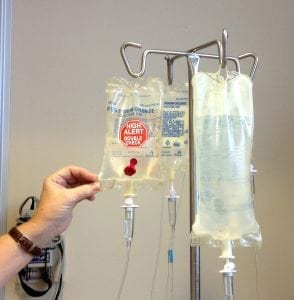Currently available therapeutics may not be adequately effective in the fight to treat late-stage acute myeloid leukemia (AML) or myelodysplastic syndromes (MDS). Researchers and drug developers are working to identify more options that can provide help to patients throughout their cancer journey. One potential option being explored is bexmarilimab, developed by Faron Pharmaceuticals. In fact, reports Ariana Pelosci of Cancer Network, the U.S. Food and Drug Administration granted Orphan Drug designation to bexmarilimab for the treatment of AML.
What is Orphan Drug Designation?
Orphan Drug designation is a status granted to drugs or biologics that are intended to either treat, prevent, or diagnose rare conditions. The definition of what constitutes “rare” differs around the world. In the United States, “rare” refers to conditions affecting fewer than 200,000 people nationwide. This means that these conditions may not be researched or evaluated as heavily as more common conditions. Companies whose drug candidates receive Orphan Drug designation also earn benefits. They receive more frequent FDA communication, fee waivers and tax credits, and seven years of market exclusivity if their drug is approved.
Studying Bexmarilimab
Bexmarilimab is a first-in-class, investigational, humanized monoclonal antibody that binds to Clever-1, an immunosuppressive receptor that allows tumors to grow and metastasize (spread). Faron Pharmaceuticals hopes that bexmarilimab will overcome treatment resistance and provide targeted care to those in need.
The therapy received Orphan Drug designation following promising results from the Phase 1/2 BEXMAB trial. Participants were split into three cohorts. They received either 1mg/kg bexmarilimab, 3mg/kg, or 6mg/kg, alongside either Venclexta or azacitidine. The treatments were relatively safe and well-tolerated, though a further readout will occur later this year to confirm. Over half of the patients in the 6mg/kg cohort hadd an objective response to treatment, with at least one person also achieving full complete blood count recovery.
Understanding AML
Acute myeloid leukemia is a blood and bone marrow cancer; it counts for just 1% of all cancer diagnoses. This cancer causes abnormal platelets, red blood cells, and white blood cells called myeloblasts to form in the bone marrow. These abnormal cells then crowd out healthy blood cells, making it harder for the body (and blood!) to work like they should. While the exact cause is unknown, radiation, chemical exposure, and certain chemotherapy drugs may increase the risk of developing this cancer. It is also more commonly found in older individuals. Available therapies include chemotherapy, Trisenox and ATRA, and stem cell transplants.
Symptoms related to AML may, but do not always, include:
- Lethargy and fatigue
- Extremely pale skin
- Unintended weight loss
- Shortness of breath
- Bone pain
- Recurrent infections
- Easy and unusual bruising/bleeding
- Fever and night sweats






